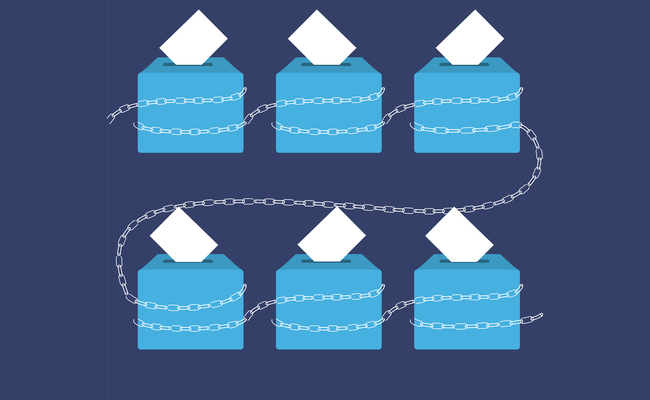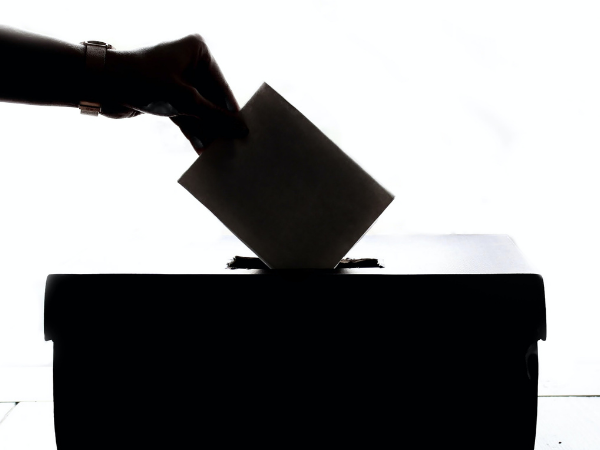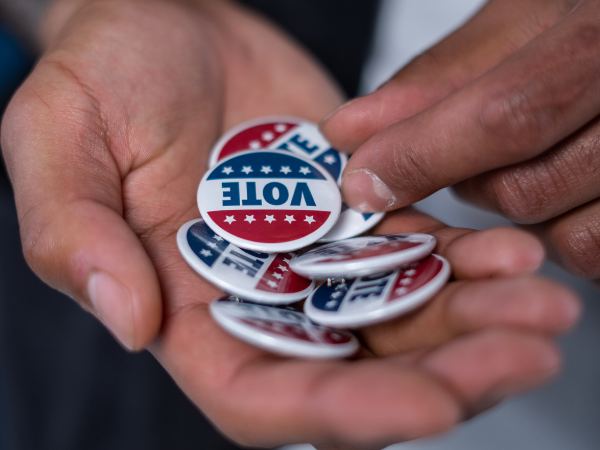Is blockchain voting the future of elections?
The worldwide cryptocurrency trend may go from digital to political with blockchain voting. Blockchain technology enhances security for bitcoin and other cryptos, and can it improve election security for political elections in the future?
First, we will go through what a blockchain is. Then, we’ll explain how a blockchain voting system could work for local and national elections. We will talk about the benefits and risks, then see if countries should use this type of voting for their elections.
Elections have faced a lot of problems for so many years. This is why people are always finding new ways of improving the process. You may see this type of online voting in your country soon, so you should know how it works.
What is blockchain?

We can’t talk about blockchain-based voting if we don’t know what blockchains are. If you’re following crypto trends, you may know it as bitcoin (BTC).
All cryptocurrencies have a blockchain, a network where no company or government looks over it. Instead, volunteers can become nodes that run the network.
If you have the right tools, you can be one too. Nodes confirm BTC transactions then get more bitcoin for their service. All these transactions show up on a public ledger.
It will show the bitcoin addresses and amounts of bitcoin involved in each exchange. However, the names remain hidden. This frees people from the hold of a person or group.
They could use bitcoin for whatever purpose, and they won’t have to give up sensitive info. This is the opposite of how current systems work.
Those rely on a central hub. Bring that down, and the whole election system breaks. This isn’t the case with a blockchain. Break a node, and it keeps going.
This means it’s more likely to continue working despite issues. This is why we see blockchain in more industries today.
What is blockchain voting?
One of the latest applications is blockchain-based voting. It uses technology to make elections more secure and reliable. Here’s how it works in simple terms:
- Download voting app – People will start by downloading an app on their mobile phones. They will need it to cast ballots remotely.
- Registration – The app connects to an online voting system that uses blockchain. Once they have the app, voters must submit certain info. Then, they could register for the election.
- Mobile voting – Now, the voters will choose their candidates via smartphone. Instead of confirming transactions, the nodes will help the voting process. Think of them as the “ballot boxes,” but for this type of internet voting.
- Checking – Afterward, voters may use their app to make sure their ballots were cast, and they could do this at any time.
One of the latest developments is blockchain-based voting. It uses technology to make elections more secure and reliable. Here’s how it works in simple terms:
- Download voting app – People will start by downloading an app on their mobile phones, allowing them to cast ballots remotely.
- Registration – The app is connected to an online voting system that uses blockchain. Voters will submit personal info for verification. Then, they could register for the election.
- Mobile voting – Now, they can vote remotely using a mobile device. Instead of confirming transactions, the nodes will help the voting process. Think of them as the “ballot boxes,” but for this type of internet voting.
- Checking – Afterward, voters may use their app to make sure their ballots were cast, and they could do this at any time.
Back then, voting needed election officials. These people are the ones who watch out for people trying to mess with the ballot boxes. They are also the folks who verify all the votes.
Blockchain voting systems could work without the help of others. Still, some people should be assigned to check for potential errors. This helps in building trust in this new voting process.
Read More: National Adoption Of Bitcoin
Types of blockchain voting
There are two ways you can have this type of electronic voting: multi-owner and single-owner. Learn more about how they work below:
- Multi-owner – This relies on multiple organizations to ensure the election runs smoothly. They could check on each other to make sure every member behaves properly.
- Single-owner – One group or agency handles the election. If you noticed, it goes against the decentralized features of a blockchain. Yet, some companies promote the so-called benefits of this system.
The benefits and risks of this voting process
This type of voting system may bring the security and reliability of blockchains into elections. Even if a part of it breaks, vote casting may continue. Also, the results show up faster.
However, there are a lot of potential problems with blockchain voting. This is common when applying a new concept on a large scale, and that’s why MIT experts released a paper about these.
Let’s look at some of the issues they mentioned. We will also include some that didn’t appear in the paper. Read below for more details:
- Vulnerable to serious failures – Someone could mess with the election results without anyone else knowing. The system may fool voters about how it recorded their ballots. After all, one group has full control of the system.
- Hard to manage – Multi-user voting relies on multiple actors working together. This is not easy to execute and handle.
- Takes longer to repair – This isn’t as simple as fixing a piece of voting software. People also have to check the multiple actors in the system, and as they do so, the system is left exposed to other attacks.
- Collusion – Having multiple groups may ensure checks and balances. Still, they could come together and manipulate the results.
- Fake apps – Someone might create a fake version of the voting app. This way, the person could pump the network with false info. As a result, that person could change the election results.
- Penetration attacks – If you’re good enough, you could break into a blockchain. One of the methods is called a Sybil attack. It involves the use of multiple nodes owned by one person. If this person owns enough nodes, each could send a “secret ballot” similar to those from existing systems.
Should countries adopt this type of electronic voting?
Despite its flaws, countries should explore this new voting method. Its technology is already changing so many aspects of our lives, and it could strengthen democracy worldwide.
Elections allow people to choose their leaders. That’s why it should truly reflect the peoples’ votes. It must also be safe from errors and attacks, and this is where blockchain voting can help.
We don’t even have to imagine its impact. Certain countries are adopting this system. Take Estonia, for example. It already has e-voting that uses blockchain tech.
Estonians may vote from anywhere in the world using their ID card. Also, they could change their votes several times before the election closes, which reduces vote-buying.
Russia also tested this method in September 2021. It used two types of online voting systems for its recent parliamentary elections. However, it faced a lot of critics.
A Bloomberg writer said it’s like what happened in the 2020 US Presidential Elections, and the opposition sounded like Donald Trump and his supporters going against the results.
It will not be that easy to use this method. Let’s say you still want to go with it. What will you need to pull it off? Let’s take a closer look at each one:
- Technology – You cannot have internet voting so easily, and it requires several tools such as fast computers and other tools.
- Education – Voters must know how blockchain works first, and this will help them trust voting online.
You’ll need years to do this. Of course, you’ll need a lot of money too. It’s up to a country whether to use this type of voting or not.
Final thoughts
People could interfere so much on election day, such as messing with paper ballots. We cannot get rid of this risk even if we apply better computer security.
Perhaps we shouldn’t be set on creating a perfect system. Instead, all we can do is make it better. After all, blockchain and voting are made by the people and for imperfect people.
You could also get better every day. For example, you could be one of the people who know this new technology. Then, you’ll be ready in case it changes parts of your life.
Start by reading free online resources. You don’t even have to dig through search results. Click here for more updates from Inquirer USA. The world’s changing, so you should too!
Related Articles
Learn more about blockchain voting
Do we have blockchain voting now?
Some countries are already using this method, such as Estonia. Also, Russia tested this method in September 2021. We may have to wait a long while before other countries use the system, and various factors like funding may prevent them from doing so.
Is internet voting safe?
MIT experts warned that this system is not safe. It’s more likely to encounter serious failures, and its users won’t even notice them. However, this could change as the technology improves. Blockchain is still new, so we may see it change more in the long run.
Should we adopt online voting?
This will depend on where you live. Some countries still have a lot to do before they can use this system. After all, you’ll need the right tools to make this work. What’s more, they should take the time to teach voters how this system may work.




